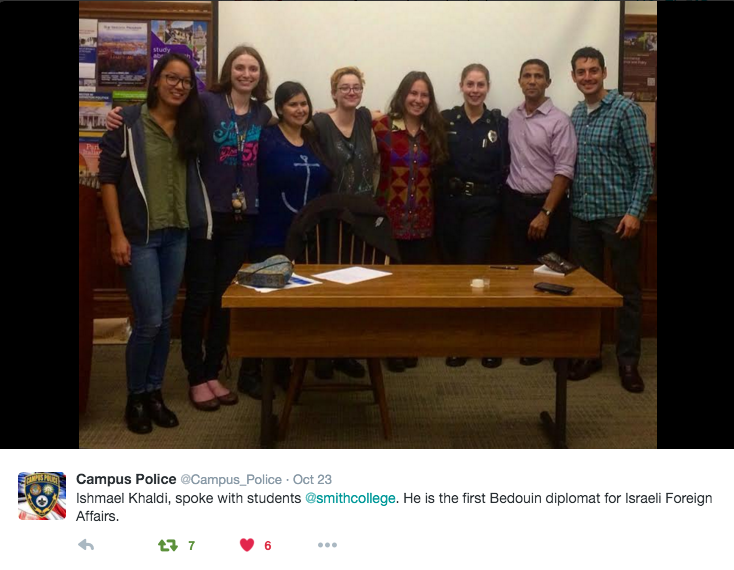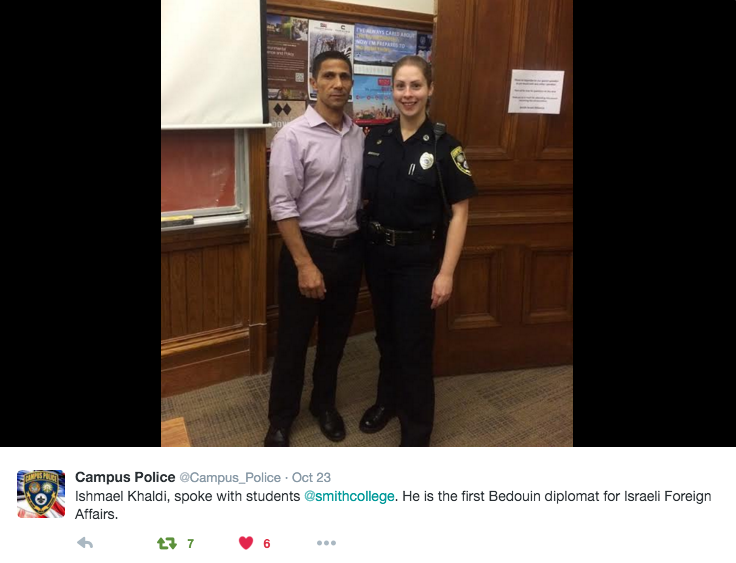
Last week, the Smith College Israel Alliance hosted Ishmael Khaldi, who delivered a lecture entitled, “Ishmael Khaldi: a Conversation on Israel’s Culture, Society and Politics from the Perspective of a Bedouin Minority in the Jewish State.”
The lecture focused on Khaldi’s experience as Israel’s first Bedouin diplomat and first Muslim senior foreign diplomat, in addition to his perspective as a minority in the Israeli government.
“Our intention in bringing Ishmael was to present Smith with someone’s account of the Israeli Bedouin community and to illustrate the minority participation in high ranking Israeli positions,” said Elizabeth Gooen ’16, co-president of the Israel Alliance. “As an organization we want to show there is more to Israeli society than its conflicts, and provide a pro-Israel narrative we feel the campus dialogue and many speakers do not.”
Khaldi expressed a similar intention for speaking at Smith, as well as other campuses around the United States.
“I can tell you from the beginning, through my experiences, I learned that sadly… people, especially in this country, and to be more specific, on campus, know few things about Israel,” said Khaldi, adding, “Nobody [is ignoring] that there is a conflict between Israel and Palestinians, but that’s not everything.”
Born in Khawaled, a village near Haifa, Khaldi lived in a Bedouin tent with his family until he was eight years old.
Having earned a Bachelor’s degree in political science from the University of Haifa and a Master’s degree in international relations from Tel Aviv University, Khaldi explained that he is representative of a generation of Bedouins whose families encouraged them to get an education, and even to assimilate. As part of the process of assimilation, Khaldi voluntarily served with the Israel Police and in the Israeli Defense Forces as a political analyst.
In 2006, Khaldi was appointed through the Israeli Foreign Ministry to serve in San Francisco. He said that while he was there, a woman asked him if he really was Bedouin since he looked just like “everyone else.” This incident inspired Khaldi to educate people about the Bedouin people in Israel.
Khaldi explained at his talk that the Bedouin communities in Israel are the native population, and that they are a tribal community that values family and tradition. The development of Jewish kibbutzim (community settlements, typically farms) near Bedouin communities, specifically his own, had positive impact on the communities, especially in the areas of employment and education.

Khaldi stressed his opinion that direct communication is the most effective tool for change. He was the first Israeli diplomat that would speak in Arabic in other Arab countries or to Arab media. In fact, he has been reprimanded for speaking to Arabic media in the past. But Khaldi explained that not answering questions directed at him would be denying communication, which is regressive.
“I think it is important to go to talks given by government employees, even those who don’t see themselves as arbiters of great political change,” said Emily Carroll ’16, who attended the talk. “It is important to learn more about Israeli politics given the enormous amount of economic, political and military support [the United States] gives to Israel.”
Khaldi emphasized the importance of learning about other cultures and countries, especially, in the United States and Israel, two countries which are strongly connected. He argued that when one has knowledge about other communities as well as a willingness to communicate with them, change will occur.
This piece was originally published in The Sophian and was written by Rachel Farber.

